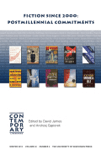
CONTEMPORARY LITERATURE
Scope & Guideline
Exploring the Evolution of Literary Voices
Introduction
Aims and Scopes
- Interdisciplinary Approaches to Literature:
The journal incorporates various disciplines such as cultural studies, postcolonial studies, feminist theory, and queer theory to analyze literary texts and their broader societal implications. - Focus on Contemporary Voices:
CONTEMPORARY LITERATURE prioritizes works by contemporary authors, particularly those from underrepresented backgrounds, allowing for a rich exploration of diverse perspectives in modern storytelling. - Critical Engagement with Social Issues:
The journal frequently addresses pressing social issues such as race, immigration, and climate change through literary analysis, emphasizing the role of literature in reflecting and shaping societal narratives. - Innovative Narrative Forms:
It explores new narrative techniques and forms, including autofiction and speculative fiction, highlighting how these methodologies challenge traditional storytelling conventions. - Emphasis on Global Literature:
The journal includes studies of global literature, focusing on transnational themes and the impact of globalization on narrative forms and content.
Trending and Emerging
- Postcolonial and Transnational Narratives:
There is a growing emphasis on postcolonial narratives and transnational studies, indicating an increased interest in how literature reflects and responds to global power dynamics and cultural exchanges. - Environmental and Climate Literature:
The emergence of environmental themes, including climate change and ecological crises, is becoming prominent in literary discussions, showcasing literature's role in addressing urgent global issues. - Intersectionality in Literary Analysis:
An increasing focus on intersectionality—examining how various social categories such as race, gender, and class intersect in literature—reflects a more nuanced understanding of identity and representation. - Digital and New Media Narratives:
Research on digital literature and the influence of new media on storytelling practices is on the rise, highlighting how technology shapes contemporary literary forms and reader engagement. - Autofiction and Personal Narratives:
The trend towards autofiction and personal narratives reflects a growing interest in subjective experiences and the blurring of boundaries between fiction and autobiography, resonating with contemporary readers.
Declining or Waning
- Traditional Literary Canon:
There has been a noticeable decrease in articles centered on the traditional literary canon, as the journal increasingly emphasizes contemporary and diverse voices that challenge established literary hierarchies. - Purely Historical Literary Studies:
Research that focuses solely on historical literary studies without connecting to contemporary issues is waning. The journal seems to favor analyses that relate historical contexts to current societal challenges. - Formalism and Aestheticism:
Interest in formalist approaches, which prioritize aesthetics over content and context, appears to be declining. The journal's current trajectory favors critical approaches that engage with social and political themes over purely formal analyses. - Eurocentric Perspectives:
The journal has shifted away from predominantly Eurocentric literary analyses, reflecting a broader commitment to inclusivity and the exploration of non-Western narratives.
Similar Journals
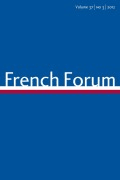
FRENCH FORUM
Connecting Scholars and Practitioners in French CultureFRENCH FORUM is a distinguished journal published by the Department of Romance Languages at the University of Pennsylvania, focusing on the rich tapestry of literature, visual arts, and performing arts within the French-speaking world. With an ISSN of 0098-9355 and an E-ISSN of 1534-1836, the journal has evolved since its inception, now covering diverse topics from 2002 to 2023. Although currently ranked in the fourth quartile in both Literature and Literary Theory and Visual Arts and Performing Arts, it provides a platform for emerging voices and critical discussions, making it an essential resource for scholars and practitioners alike. FRENCH FORUM aims to cultivate interdisciplinary dialogue, offering insights that resonate with contemporary cultural and literary studies while supporting the exploration of both canonical and avant-garde works. Despite its open access status, the journal continues to be a relevant player in academia, inviting contributions that challenge, shape, and redefine the landscape of French studies.

Current Writing-Text and Reception in Southern Africa
Exploring the Rich Tapestry of Southern African LiteratureCurrent Writing-Text and Reception in Southern Africa is a premier journal published by Routledge Journals, Taylor & Francis Ltd., specializing in the vibrant field of Literature and Literary Theory. With ISSN 1013-929X and E-ISSN 2159-9130, this journal has been a pivotal platform for scholarly discourse since its inception in 1989, continuing through to 2024. Located in the United Kingdom, it emphasizes the uniquely diverse literary landscape of Southern Africa, making it an essential resource for researchers, professionals, and students who engage with the rich cultural narratives of the region. Ranking in the Q3 category for Literature and Literary Theory, it holds a commendable position in the Scopus ranks, situated at #424/1106 with a 61st percentile, highlighting its influence and relevance in academic discussions. Though not open access, this journal serves as a vital conduit for innovative research, critical analysis, and theoretical exploration, underpinning the significance of text and reception in contemporary literary studies.
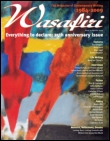
Wasafiri
Celebrating 40 years of transformative cultural exploration.Wasafiri, published by Routledge Journals, Taylor & Francis Ltd, stands as a pivotal platform in the fields of Cultural Studies and Literature and Literary Theory. With a proud publication history extending from 1984 to 2024, this esteemed journal delivers critical insights and cutting-edge research that explore the intersections of culture, literature, and global discourse. Renowned for its academic rigor, Wasafiri holds a Q3 ranking in both its categories as of 2023, showcasing its solid contributions to the scholarly community, reflected in its respectable Scopus rankings—evidencing its relevance and authority, particularly in the literature field. While available through subscription, the journal emphasizes the dissemination of diverse voices and innovative scholarship, appealing to researchers, professionals, and students eager to deepen their understanding of contemporary cultural narratives. Positioned in the United Kingdom, Wasafiri continues to foster vibrant dialogues that challenge conventional paradigms, making it an invaluable resource for anyone engaged in the humanities.

TEXT & KRITIK
Unveiling critical frameworks for contemporary analysis.TEXT & KRITIK, an esteemed academic journal published by EDITION TEXT KRITIK GMBH in Germany, serves as a critical platform for advancing scholarship in the fields of literature and literary theory. With an ISSN of 0040-5329, this publication aims to foster rigorous discourse and stimulate intellectual inquiry from 2009 to 2023, reflecting the evolving landscape of literary studies. Although categorized in the fourth quartile (Q4) in the 2023 measure of literature and literary theory, TEXT & KRITIK consistently engages with a diverse array of literary perspectives and methodologies, addressing both historical texts and contemporary literature. Researchers, professionals, and students alike are encouraged to explore this resource to deepen their understanding of critical texts and theoretical frameworks. While it does not currently operate on an open access model, its curated content remains a vital resource for anyone dedicated to exploring the nuances of literary analysis and criticism.
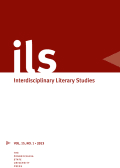
Interdisciplinary Literary Studies
Bridging Diverse Perspectives in Literary StudiesInterdisciplinary Literary Studies is a prominent journal published by Penn State University Press that delves into the rich and diverse field of literature and literary theory. Established to foster scholarly dialogues, this journal embraces an interdisciplinary approach, making it a valuable resource for researchers, practitioners, and students interested in the multifaceted dimensions of literature. With an ISSN of 1524-8429 and an E-ISSN of 2161-427X, the journal operates without open access, reflecting its commitment to maintaining rigorous academic standards. The journal is ranked in the Q3 quartile of literature and literary theory for 2023 and holds a Scopus rank of #730 out of 1106, placing it in the 33rd percentile, which further emphasizes its emerging stature within the academic community. Spanning converged years from 2017 to 2024, Interdisciplinary Literary Studies continues to impact the dialogue within the humanities, encouraging nuanced analyses and interdisciplinary connections that push the boundaries of literary scholarship. Set in the United States, the journal is dedicated to exploring contemporary and historical texts, critical theories, and diverse literary forms, making it an essential publication for anyone passionate about the evolving landscape of literature.

JOURNAL OF MODERN LITERATURE
Advancing Critical Conversations in LiteratureJOURNAL OF MODERN LITERATURE, published by Indiana University Press, is a distinguished peer-reviewed journal that delves into critical examinations of modern literary texts and theories. Since its inception, the journal has served as a vital platform for scholars dedicated to the exploration of contemporary literature, making significant contributions to the discourse within the field. With an impressive ranking of Q2 in the Literature and Literary Theory category as of 2023, it positions itself among the top-tier journals in its domain, reflecting its strong impact within academic circles. This journal not only fosters scholarly dialogue but also embraces innovative approaches to literary criticism, ensuring relevance in today’s dynamic cultural landscape. Researchers, professionals, and students will find a rich repository of articles that engage with various modern literary paradigms, enhancing their understanding and appreciation of the intricate relationships between literature and broader socio-cultural contexts. Though it does not operate under an open access model, the journal's extensive reach through its digital ISSN (1529-1464) and print ISSN (0022-281X) allows for valuable insights to be disseminated to the appropriate audiences.

Literary Voice
Connecting Scholars to Contemporary Literary DebatesLiterary Voice is a pioneering journal dedicated to the exploration and critique of literature and its multifaceted dimensions. Established in Punjab, India, and published by LITERARY VOICE, this journal aims to serve as a vital platform for scholars, researchers, and enthusiasts in the field of literary studies. With its ISSN 2277-4521 and E-ISSN 2583-8199, Literary Voice strives to foster intellectual discourse and encourage innovative scholarship through diverse thematic issues. While currently operating without an open access model, the journal provides a crucial space for the dissemination of original research and critical analysis that contribute to the enrichment of literary understanding. As an emerging publication in the humanities, Literary Voice invites submissions from across the globe, making it an essential resource for those looking to engage with contemporary literary debates and foster cross-cultural dialogues.
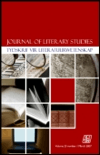
Journal of Literary Studies
Redefining the boundaries of literary exploration.Journal of Literary Studies, published by UNISA PRESS, is a premier open access journal dedicated to advancing the field of literature and literary theory. With its ISSN 0256-4718 and E-ISSN 1753-5387, the journal has established itself as a leading platform for innovative research since its inception in 1985, with a notable convergence period running through to 2024. Recognized in the Q1 quartile of literature and literary theory, the journal ranks impressively at #236 out of 1106 in its category according to Scopus, highlighting its impact in the arts and humanities with a percentile rank of 78th. The journal's open access model, adopted in 2022, reflects its commitment to accessibility and dissemination of knowledge globally, making it an essential resource for researchers, academics, and students alike. With an editorial focus on interdisciplinary approaches and contemporary critical discourse, the Journal of Literary Studies serves as a vital vessel for the exchange of ideas and scholarly dialogue in the intricate landscape of literary studies.

ItinerArios-Revista de Literatura
Unveiling New Perspectives in Literary AnalysisItinerArios-Revista de Literatura is a distinguished academic journal published by Universidade Estadual Paulista (UNESP), located in the vibrant city of Araraquara, Brazil. With a commitment to exploring the depths of literary analysis and theory, this journal serves as a crucial platform for scholars, researchers, and students to disseminate their work in the field of literature. Though the journal does not currently offer open access, it boasts a comprehensive focus on various literary traditions, critical interpretations, and emerging trends within the literary landscape. The ISSN for the print edition is 0103-815X, ensuring its recognition in the academic community. By providing a valuable forum for innovative research and engaging discussions, ItinerArios plays an essential role in enriching the discourse in the realm of literary studies, appealing to professionals and enthusiasts alike who are eager to contribute to and engage with contemporary literary scholarship.

Metacritic Journal for Comparative Studies and Theory
Exploring the Intersection of Arts, Humanities, and Social Sciences.Metacritic Journal for Comparative Studies and Theory is a premier scholarly publication focusing on interdisciplinary research within the fields of Arts and Humanities, as well as Social Sciences. Published by UNIV BABES-BOLYAI, FAC LETTERS, PHANTASMA CTR IMAGINATION STUDIES, this Open Access journal has made significant strides since its inception in 2015, providing a platform for innovative comparative studies that inspire critical discourse. With an impressive Q2 ranking in both Arts and Humanities and Social Sciences, the journal showcases high-quality research that engages contemporary issues and theoretical frameworks. Its Scopus rankings further highlight its impact, with a noteworthy position in the 78th percentile for Arts and Humanities and 40th percentile for Social Sciences. As an accessible resource for researchers, professionals, and students, the journal encourages contributions that navigate complex themes of interpretation and imagination that resonate within and beyond Romanian scholarship. Discover the latest insights and foster collaborations in a dynamic academic landscape.